Sep 22, 2025. Day 3 in Thailand, Dharma Q&A for Korean Expats in Bangkok
Hello. Today, Sunim surveyed potential sites for establishing a JTS training center near Bangkok Airport, held a Dharma Q&A for Korean expats living in Bangkok, and then returned to Korea.
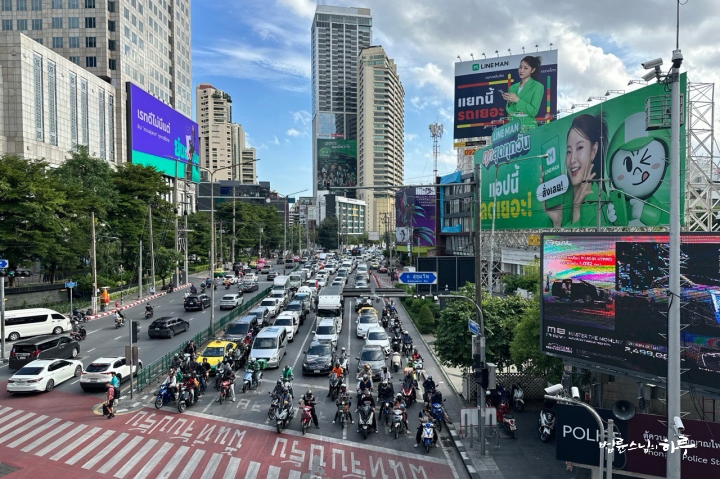
After arriving at the accommodation at 1:30 AM, Sunim took a brief rest, completed morning practice and meditation, and departed at 10 AM to survey the JTS training center site. Jungto Society member Hwang So-yeon and her husband also accompanied him. They visited several candidate sites for the JTS training center that could be reached within an hour from Bangkok’s two airports.
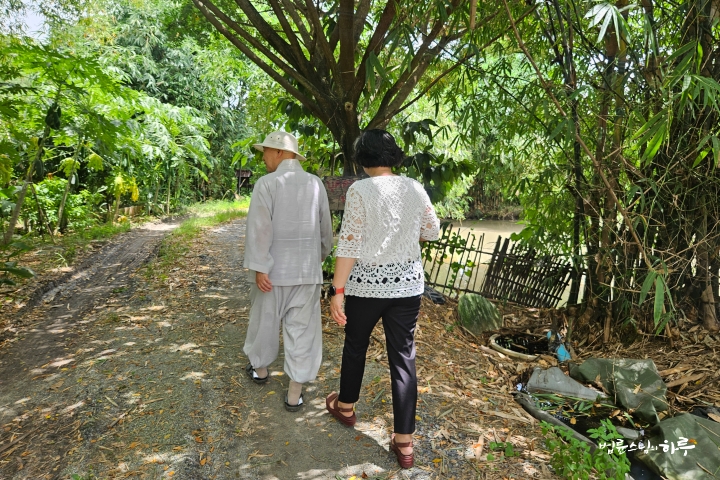
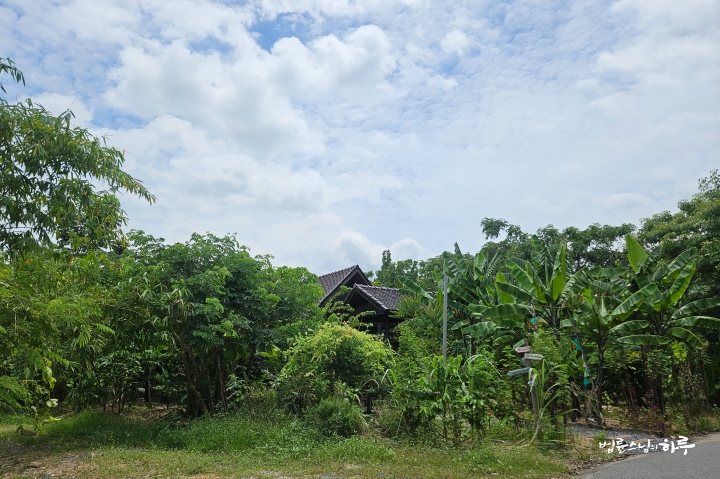
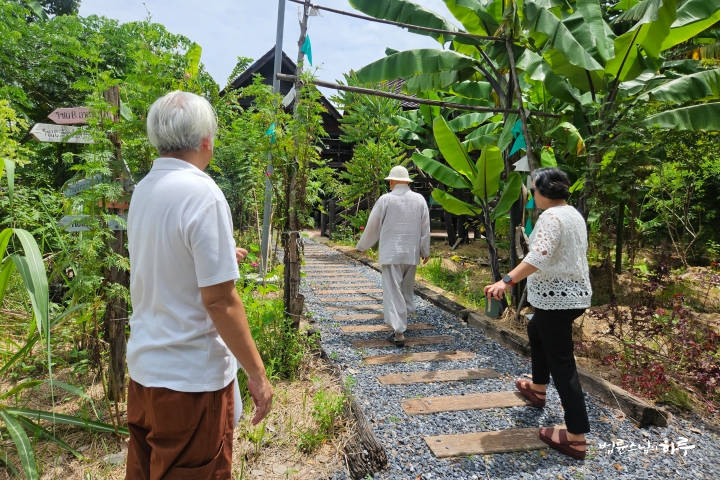
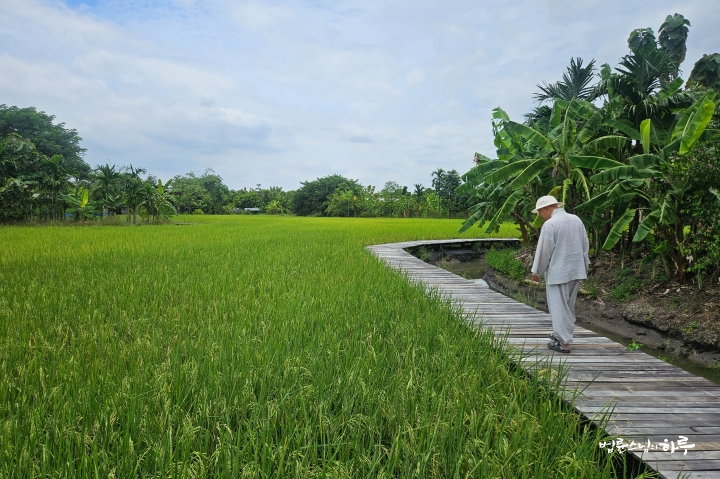
After returning to the accommodation for a brief rest, Sunim headed to the lecture venue.
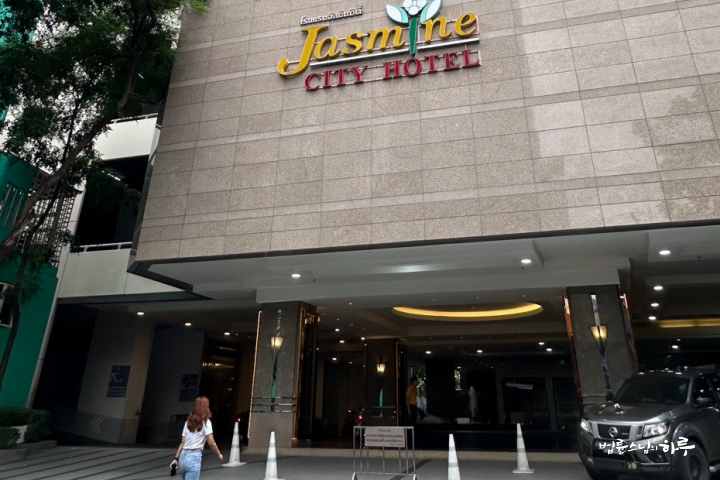
Today’s lecture was held at the Jasmine City Hotel, located in Bangkok’s Sukhumvit area. This venue is frequently used for international gatherings and lectures due to its convenient transportation and surrounding environment. Today, Venerable Pomnyun Sunim’s Dharma Q&A was held here.
From 4:30 PM, Sunim had a conversation in the waiting room next to the lecture hall with JTS volunteers who had returned from refugee support activities in the Mae Sot area along the Thai border. Sunim first asked the volunteers about the local situation.
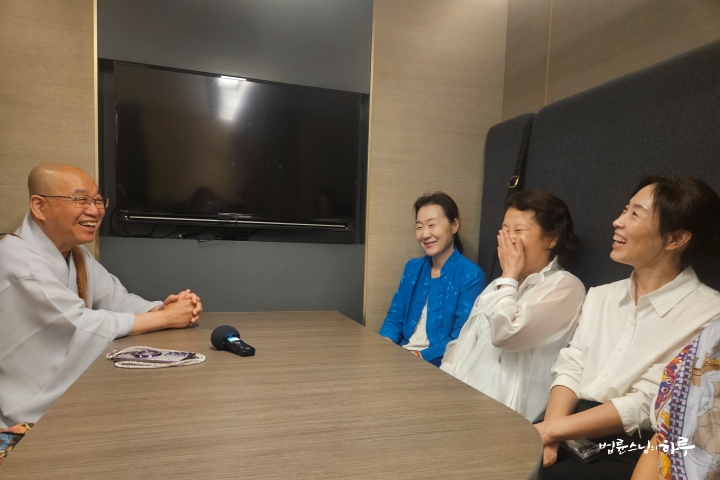
“I didn’t go to Mae Sot this time, but visited the northern border in Chiang Mai Province. INEB (International Network of Engaged Buddhists) said there was a need to protect girls in that area. You all visited the western Mae Sot region – what additional help did you find was needed after seeing it firsthand? From a Korean perspective, everything might seem lacking, but the situation outside the border is still better than inside Myanmar.”
The volunteers reported on the local situation they had assessed through four visits. At one school, they said they were preparing meals for 300 people, but it actually looked like only enough for a few dozen people due to food shortages. Another school reported that children frequently fell ill due to a nearby landfill. The situation varied by school – some didn’t need much help, while others desperately needed whiteboards, chairs, desks, and stationery.
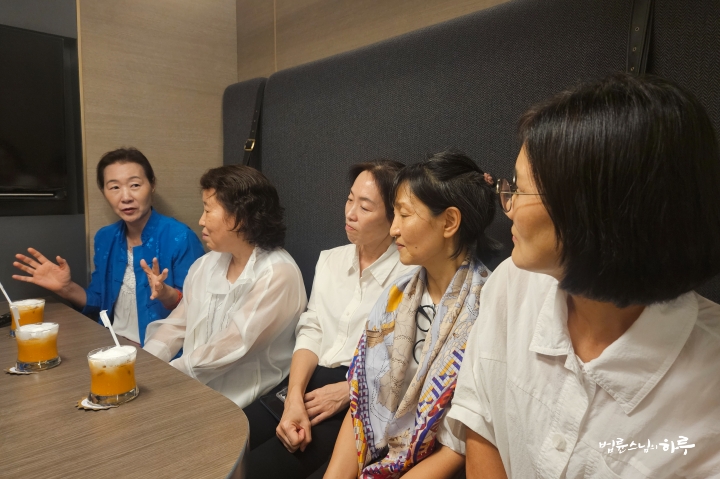
After listening to the volunteers’ stories, Sunim explained the changing situation in the refugee camps.
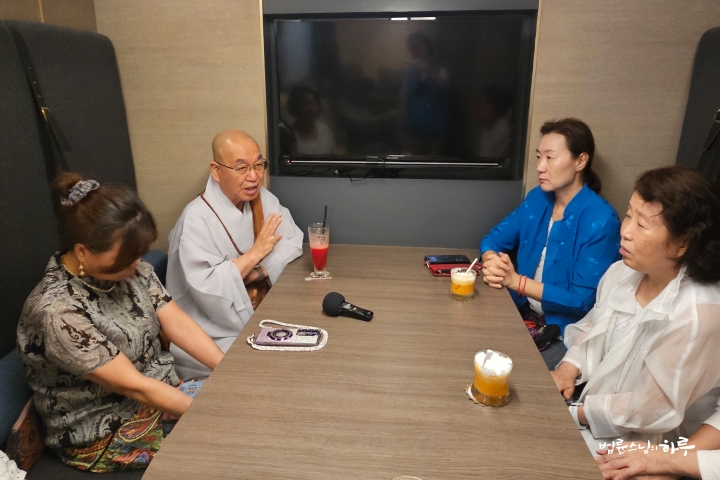
“Myanmar refugees have been coming and going to Mae Sot for decades. We recently became interested again because many refugees crossed over after conflicts arose following the coup four years ago. That’s why emergency relief was needed. But after a few years, everyone has now built houses and settled down. Unlike the temporary tents of the past, schools are now operating almost like regular schools with people permanently settled. This area should now be viewed as an impoverished region where poor people live, rather than a refugee camp needing emergency relief. Most have homes, and children are attending school. Since it’s been four years since we started supporting Mae Sot, it’s time to change our support approach. We need to either withdraw emergency relief or shift direction to poverty assistance and transform it into a sustainable form. I’ve listened carefully to your stories.”
After an hour of conversation and taking commemorative photos, they went to the lecture hall.
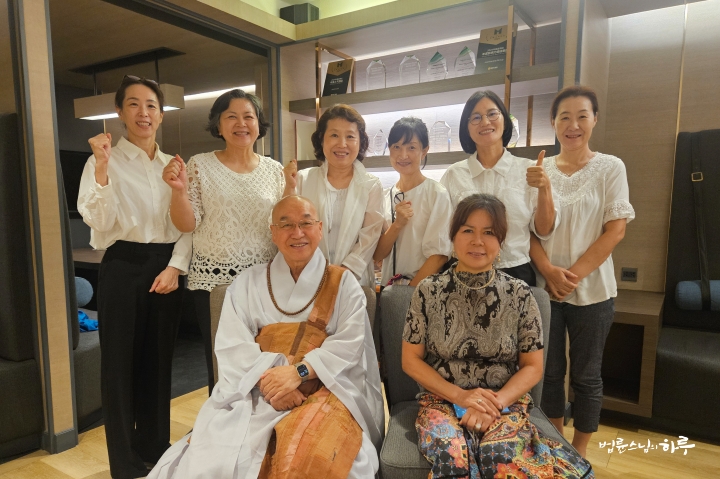
After greeting the volunteers preparing for the lecture, Sunim had dinner with a packed meal at the accommodation.
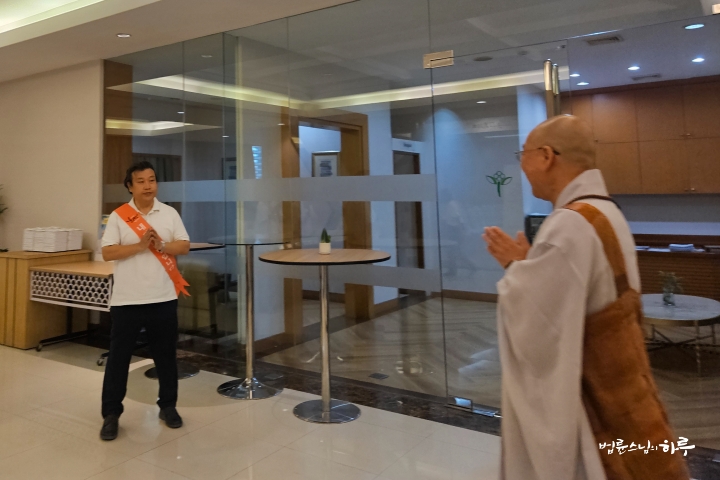
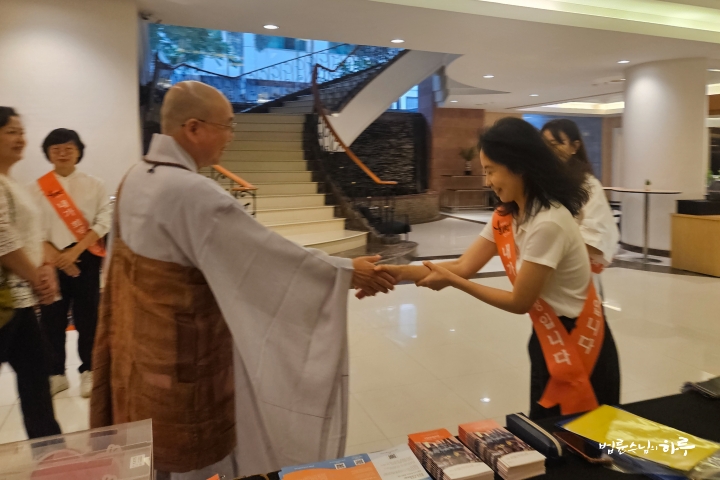
From 7 PM, Sunim had tea and conversation with local dignitaries in the waiting room next to the lecture hall. He met with nine local figures, including the newly elected president of the Korean Association. Sunim shared about his recent European lecture tour and his visits to Myanmar, Cambodia, and Thailand, and had extensive discussions about Thai Korean Association activities.
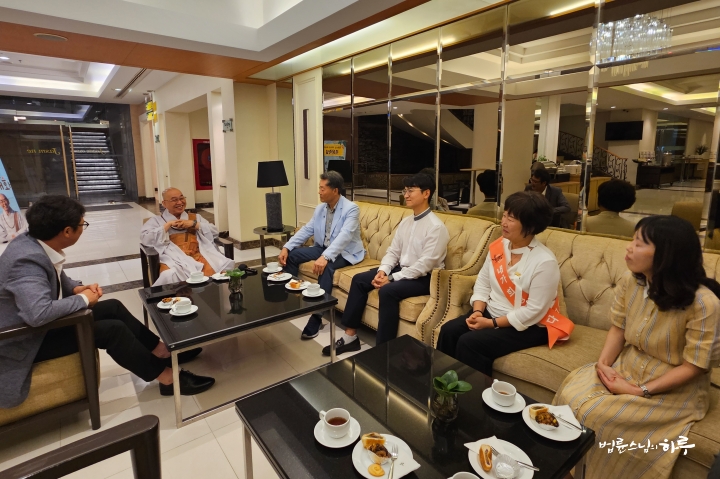
As they conversed, it was time to begin the lecture. They took a commemorative photo together and moved to the lecture hall.
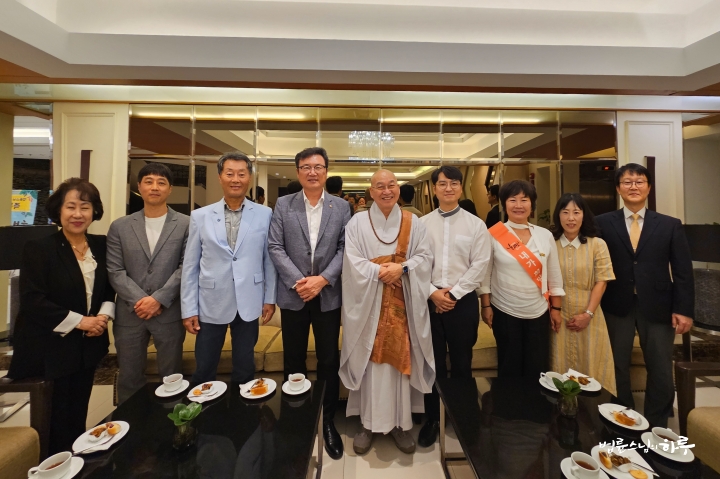
At 7:30 PM, an introductory video about Sunim was shown. When the video ended, Sunim walked onto the stage to great applause. Sunim began the conversation by sharing news from his meetings with refugees over the past week.
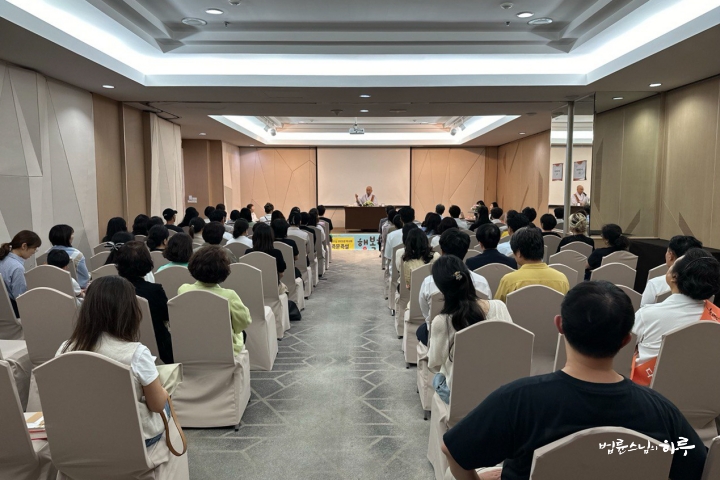
“Since last August, I’ve been traveling around the world giving lectures to Korean communities. When I counted how many flights I need to take this year, it came to 69. Envious, right? How wonderful to take so many flights when it’s difficult to take even one! These days, I’m living while constantly on the move.
How Can We Help Children Unprotected Amid War and Earthquakes?
Over the past week, I’ve surveyed Myanmar, Cambodia, and Thailand. Myanmar is currently in ongoing civil war, with the military bombing ethnic minority areas while ethnic minorities resist through guerrilla warfare. This has caused people to flee their homes for other regions, creating refugees both inside and outside Myanmar. They’re divided into internal refugees who move to safer areas within the country, and international refugees who cross borders into Thailand and Bangladesh. Additionally, an earthquake early this year caused significant damage. I visited the areas where earthquake damage was greatest – Mandalay and Sagaing regions. When I asked people in refugee camps whether they fled because of war or earthquake, many answered ‘both.’ Earthquake victims were mainly living in tents set up along roadsides, and among war refugees, there were many children separated from their parents. In these cases, boys had their heads shaved to become novice monks, and girls were made into nuns for protection. I looked into how to support these refugees.
The areas in Thailand bordering Myanmar are Mae Sot and Chiang Mai, with the Chiang Mai border taking five hours by car from Chiang Mai. In this border region, both the Myanmar and Thai sides are the same Shan ethnic group, so although the refugees are illegal residents, they seemed to be settling relatively well. Seeing this reminded me of when our North Korean compatriots crossed into China due to food shortages. Most North Korean residents crossed the Tumen River, and since our ethnic Koreans lived in that area, they were initially well protected. But later, when too many North Koreans crossed over, various problems arose including human trafficking.
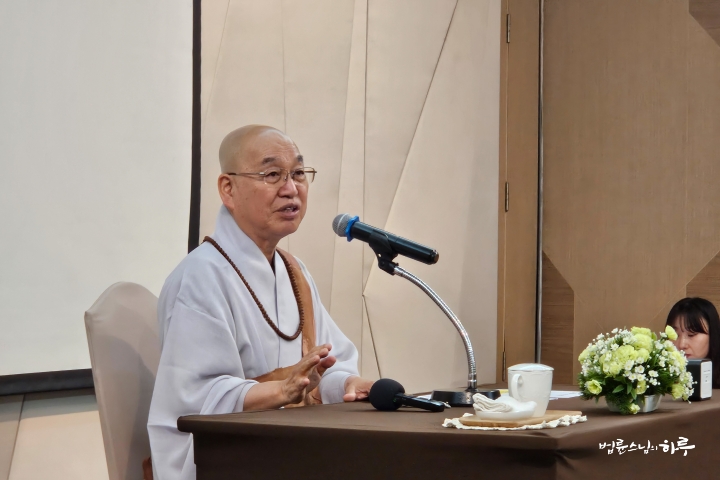
Currently, there is a significant increase in refugees and migrants worldwide, leading to severe conflicts within countries. In particular, extreme right-wing tendencies that hate immigrants seem to be spreading rapidly around the world. In my view, the fundamental problem is the wealth gap. The wealth gap is widening rapidly right now. Not only is there a wealth gap between countries, but the wealth gap within countries is also becoming more severe. As the wealth gap between countries widens, people from poor countries find it difficult to live in their own countries, so they are migrating to wealthy countries by any means necessary, whether legal or illegal. Even in relatively wealthy countries, because the internal wealth gap is severe, poor people in those countries are strongly resisting, claiming that people coming from abroad are taking their jobs.
Usually, people think the right wing consists of the rich and the left wing consists of the poor, but many of the far-right extremists in Europe and America today are poor people. Due to resistance against immigrants, this shows many different characteristics from the previous left-right ideological conflicts. On the other hand, nationalism is also becoming stronger. In developed countries that pursue equality and have good social security systems, if they live among themselves, they receive many social security benefits. However, when immigrants keep coming in, they have to share these benefits, so there is significant resistance. Among young people in our country, there is also high opposition to unification with North Korea. This is because they think that if unification happens, we will have to share what we have with poor North Korean people. The reason Britain withdrew from the European Union (EU) was also because they had to share social security benefits with Eastern Europe within the EU. The opposition was particularly strong among the elderly, which ultimately led to the withdrawal from the EU.
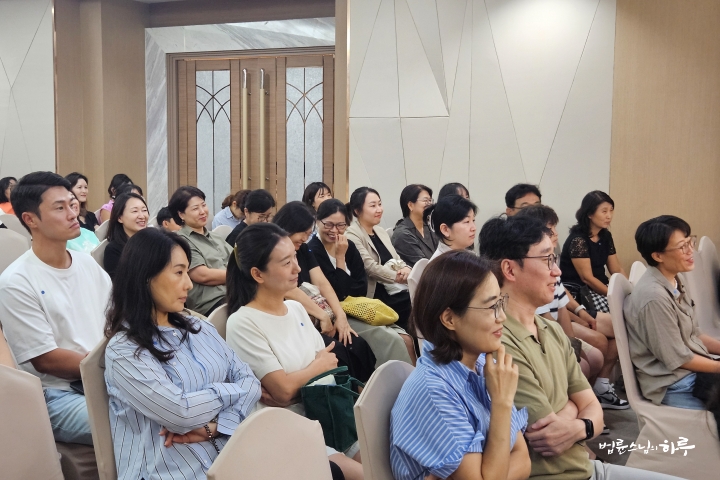
In an Era of Division, Why We Must Stay on the Right Path
For 80 years after World War II ended, democratic ideals like equality, peace, and social justice flourished. Now, it seems like a backlash is sweeping across the world. Conflicts between nations are intensifying, and within countries, polarization and political extremism are worsening. When you look at Korean politicians fighting, it’s almost like watching a trashy drama, isn’t it? Members of the National Assembly are degrading their own dignity by using street thug language inside the parliament. Even looking at the language President Trump uses, a national leader is publicly using harsher language than ordinary citizens.
It seems like we’re living in an era where emotional control is difficult. You all get angry a lot too, don’t you? But what can we do? No matter what the world is like, we must prevent war, preserve peace, help those in need, overcome the climate crisis, and reduce the wealth gap. However, even with our efforts, the situation seems likely to get worse. Does that mean there’s no need to try? No. That’s not how life works. We can’t judge life solely by its outcomes. If it’s the right path, we must continue forward without being attached to results. If we evaluate things not in the short term but from a perspective of 100 years later—asking what would have been truly important for us to do at that time—we’ll be less swayed by this social chaos.”
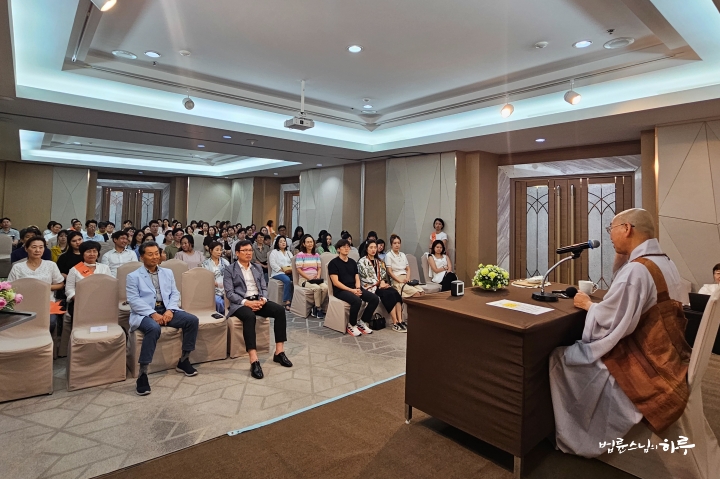
Following this, Sunim had conversations with four people who had submitted questions in advance, and then took questions from six people on-site. During the two-hour session, he was able to have dialogues with ten people. One of them sought Sunim’s advice about their wavering identity within a multinational family. They confessed that as family members live within different Buddhist traditions and customs, their attachment to “I am right” grows stronger, and it becomes difficult to acknowledge the possibility that they might be wrong.
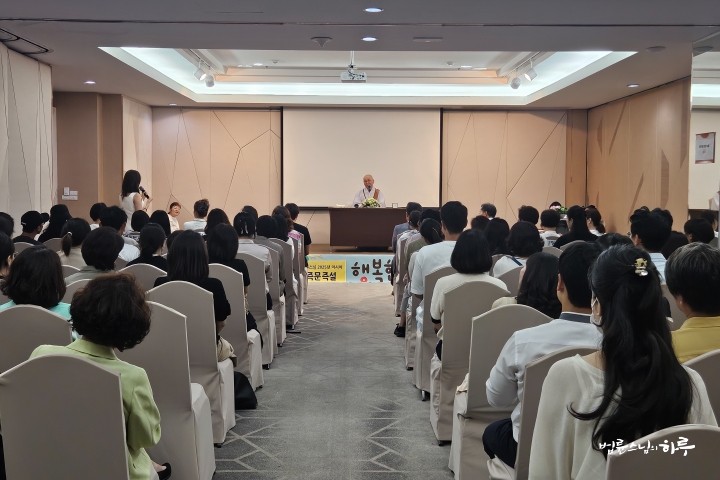
How Should I Maintain My Identity in a Multinational Family?
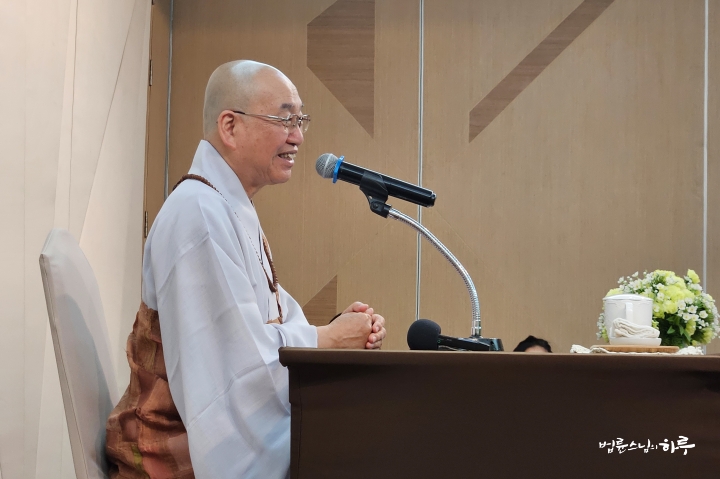
“What do you mean by Korean identity?”
“My husband is Thai, and the person who works in our house is from Myanmar. We are all Buddhists, but their Buddhism is different from what I know. The monks here look very different from the monks I’ve seen and heard about until now. Since my daughter spends a lot of time not only with her parents of different nationalities but also with the Myanmar person who takes care of the house, she naturally greets monks in the Myanmar style. Since everything is different – the way of thinking, the way of treating people, the way of expressing anger – what I’ve believed to be right throughout my life is being shaken. When my thoughts clash with others or when I realize that what I’ve thought until now isn’t the truth, I find it difficult to quickly accept that I was wrong. It’s hard to realize and acknowledge that I’ve been living wrongly until now.”
“What do you think is the core teaching of Buddhism? Just tell me one thing that you remember. What image usually comes to mind about Buddhist thought?”
“Isn’t the core of Buddhist thought ‘accept things as they are’?”
“That’s right. Just accept things as they are. Thailand is like this. Myanmar is like that. Second, there is the concept of emptiness (空) in Buddhism. In ‘form is emptiness, emptiness is form’ (色卽是空 空卽是色), what does emptiness (空) mean? Does it mean there is right and wrong, or that there isn’t?”
“It means there is no right or wrong.”
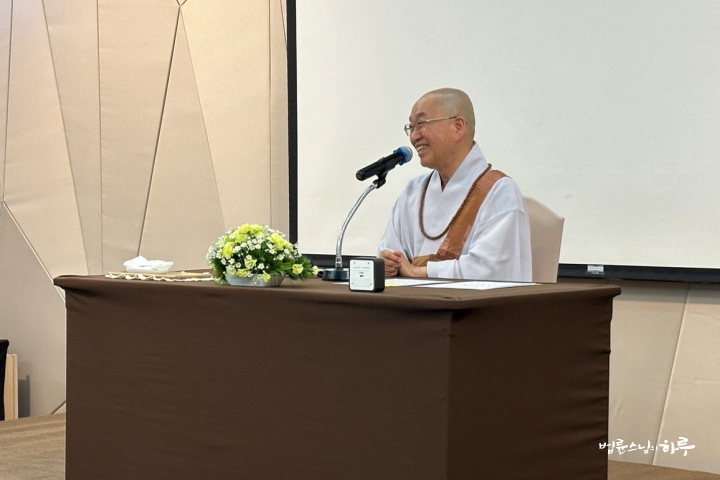
“Yes, the core teaching of Buddhism is that there is no right or wrong. However, in Christian thought, good and evil are clear. That’s why there are angels and Satan. Buddhism doesn’t have such things. Since there is originally no right or wrong, it teaches us to ‘transcend disputes.’ Buddhism says there is no birth and death (生滅), no coming into being or passing away. So it’s neither birth nor death (不生不滅). Neither pure nor impure (不垢不淨). Neither increasing nor decreasing (不增不減). This is the core teaching of Buddhism. You don’t know Buddhism at all.
As you said earlier, if you just accept things as they are, you can see ‘Thailand is like that,’ ‘Myanmar is like this,’ ‘Looking at things as they are, they are different from each other.’ The core teaching of Buddhism is that there is originally no right or wrong. If you knew even a tiny bit about Buddhism, you would accept that Myanmar Buddhism, Thai Buddhism, and Korean Buddhism are each different, and you wouldn’t dispute the differences between what this person, that person, and you think. You asked how to accept that you were wrong, but just as that person isn’t wrong, neither are you. You first said ‘I am right and you are wrong’ about the differences, then when you realized that wasn’t the case, you now think ‘I was wrong.’ First you say ‘You are wrong,’ then second ‘I am wrong.’ Saying you are wrong or I am wrong means you’re still standing from the perspective that there is right and wrong, correct and incorrect.”
“So you’re saying both I am right and they are right?”
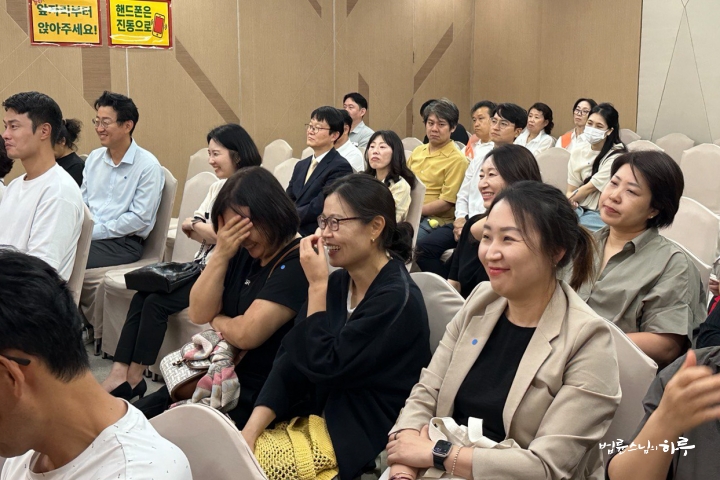
“No. They’re not wrong and I’m not wrong, they’re not right and I’m not right either. There is no right or wrong. They are just different. It’s not that putting your hands together this way is right and that way is wrong – the greeting methods are just different. The ways of bowing are different, the shapes of Buddha statues are different, the temple structures are just different from each other. Just as they are not wrong, neither are you. Conversely, they are not right and neither are you. There is originally no right or wrong, just differences. When two people are wearing clothes, it’s not that one is wearing them correctly and the other incorrectly – the colors and styles of the clothes are just different. It’s not that a white complexion is good and a dark one is bad – the skin colors are just different. Are men superior and women inferior? No. The opposite isn’t true either. Gender is just different, and race, religion, and beliefs are all just different from each other. Even within the same Buddhism, it looks different by country, and even within our country it’s different by sect, different by temple, and even within the same temple it varies slightly by monk. If you think ‘Why does that monk speak that way while this monk speaks this way?’ it’s because you have the perspective that they should be the same. You just need to see it as ‘This monk speaks this way, and that monk speaks that way.’
“Yes, thank you.”
You seem worried that your child might be confused, but that’s not the case. The child is adapting by seeing all three at the same time. We get confused because we adapt to one thing and then do another, but your child is experiencing all three simultaneously. Adults think we should focus on just one thing when studying. They say we should either listen to music or study, do only one thing, but children who have grown up studying with music in their ears are doing both things at the same time. The way we’ve done it is to learn Korean completely first and then learn English later, but if your child learns Korean from mom, Thai from dad, and Myanmar from the housekeeper from an early age, all three languages become native languages simultaneously. However, their level might be slightly lower than someone with just one native language. But you don’t need to worry about whether the child’s identity is Thai, Korean, or Myanmar. That kind of distinction was only necessary based on people from the past – the child’s identity contains a bit of all three.”
“Yes, that really seems right. Actually, my mother-in-law is Filipino and only speaks English, so my child is doing four languages simultaneously.”
“These days in Korea, to be a village chief in the countryside, you need to speak five languages simultaneously. Because the women who have married into the villages include Filipino women, Thai women, Vietnamese women, and Chinese women.” (laughter)
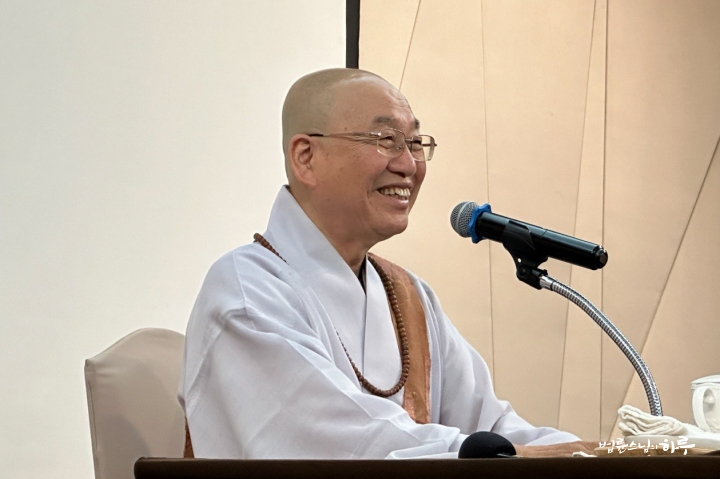
“I’ll try to accept it well like a child does. Thank you.”
“Don’t say right or wrong, just see ‘This person is like this,’ ‘That person is like that.’ It’s not wrong. They’re just different. When things are different, you have freedom of choice. You can clean the room this way or that way. Since neither is wrong or right, I can choose my own way. Of course, you can also tell your child ‘There are various ways, but let’s make this choice.’ To the person working in your house, you can say ‘There’s that method and this method, but since this is my house, I’d like it done this way.’ Don’t say they did it wrong. If you have conversations this way, you can make adjustments without getting angry.”
“I understand well.”
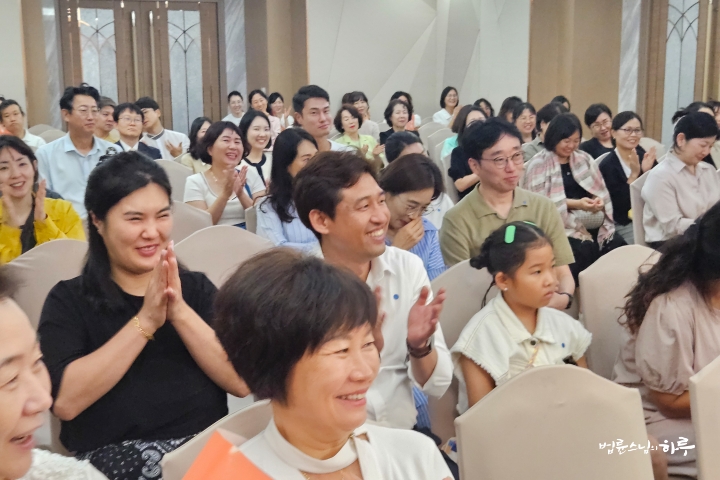
Questions continued to follow.
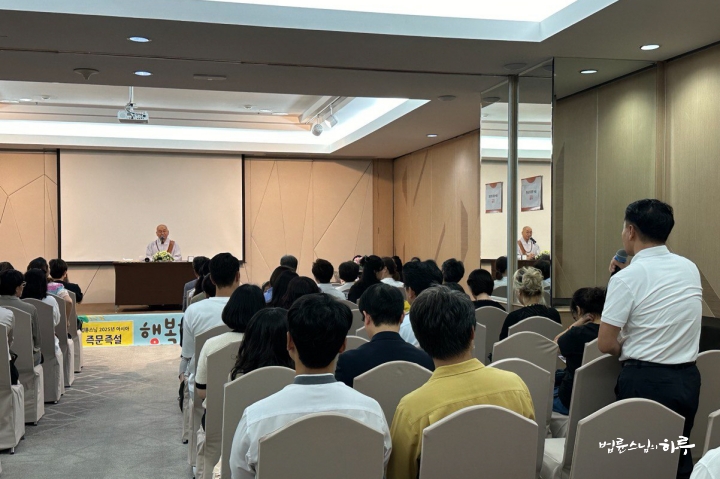
How can I control my mind and live without getting angry?
What values can fill the emptiness that remains even after achieving what I wanted, and how can I let go of greed?
How can we live while preserving human dignity and value in an era where AI replaces humans?
When I, who don’t get angry easily, appear easy to push around, how much anger expression is necessary to live comfortably?
How should I teach and guide my child about lying in a society where lies are prevalent?
How can I reduce the anxiety that has grown after losing my parents and restore peace of mind?
What life direction should I take to live well without regrets after retirement?
As a Buddhist, is it okay to sell a temple I inherited, and how should I dispose of it?
As the lecture was coming to an end, the former president of the Korean Association expressed gratitude, saying that the great enlightenment gained from asking Sunim a question a few years ago has been a great source of strength until now. The Korean residents who attended also expressed their gratitude to Sunim with loud applause for giving an enthusiastic lecture for over two hours.
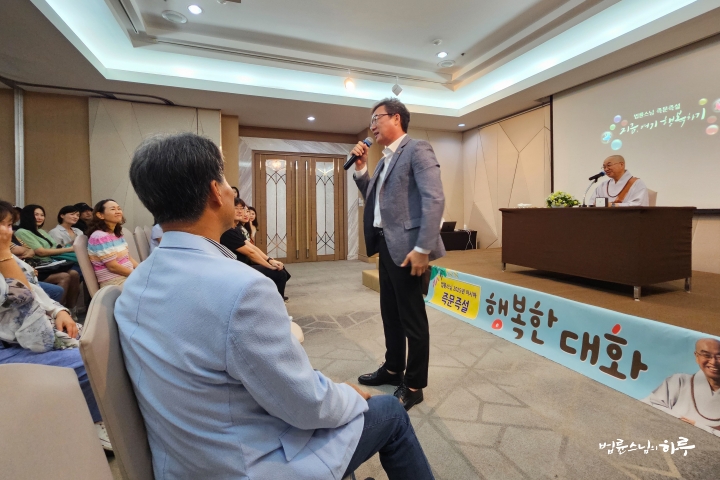
The lecture ended with thunderous applause. A book signing session followed. Most of the audience members received autographs from Sunim and expressed their gratitude.
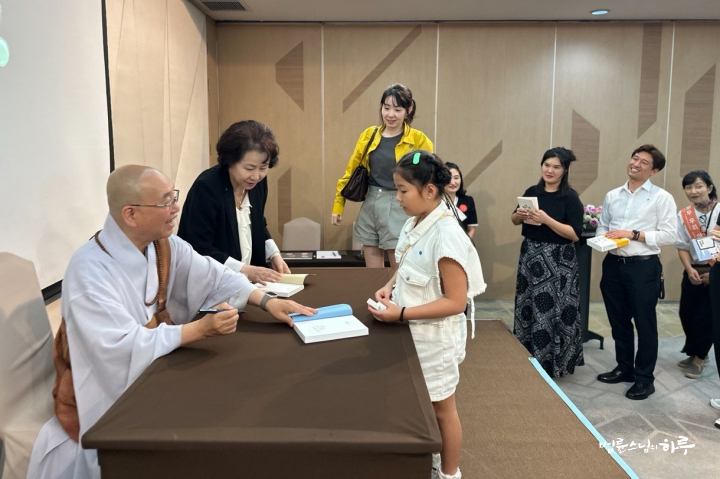
After all the audience members had left the lecture hall, Sunim took a commemorative photo with the volunteers who had prepared the lecture.
“Bangkok, fighting!”
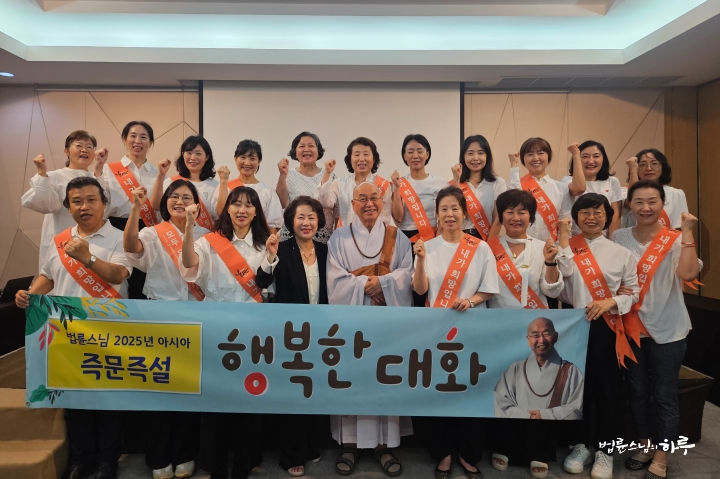
They then sat in a circle and had time to share their thoughts with the volunteers. First, the volunteers took turns introducing themselves.
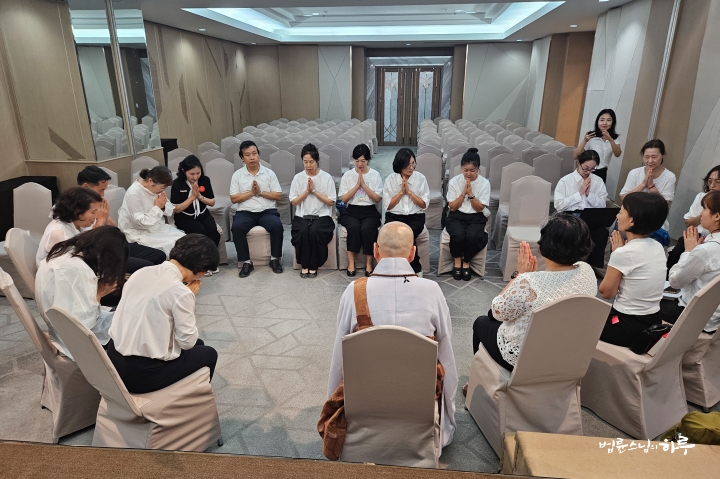
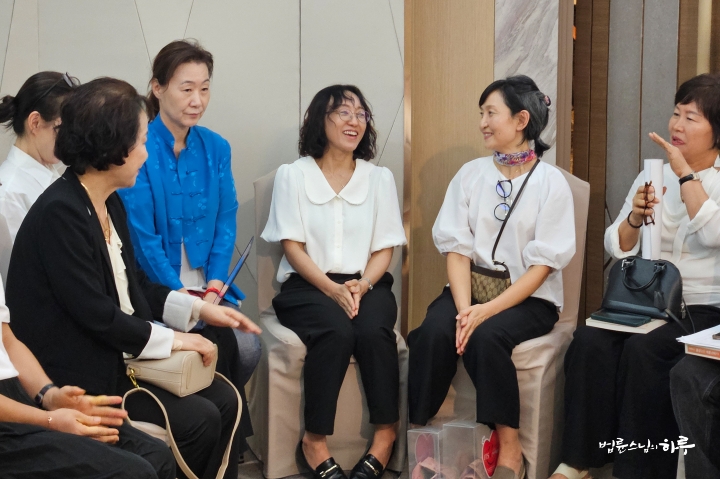
Various volunteers participated, from those who had lived in Thailand for 26 years to those who had only been there for 6 months. Not only Bangkok Jungto Society members but also the Asia Division Director from Manila and members of the International Division worked together to prepare the lecture. After the volunteers’ introductions were finished, Sunim shared his thoughts.
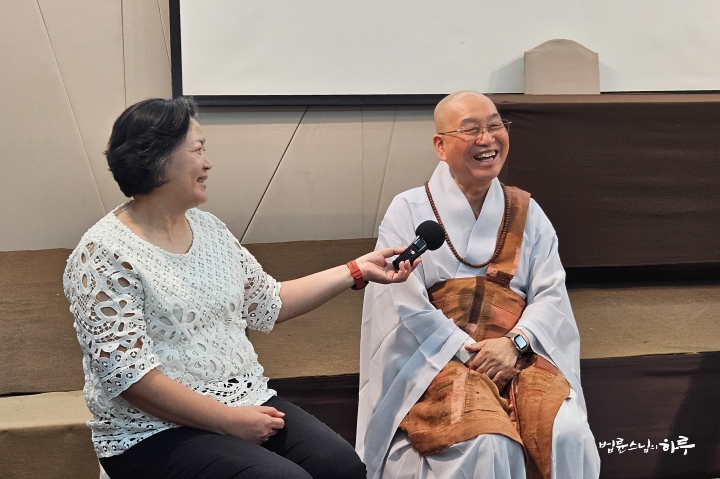
“It’s nice to meet all of you again. Listening to the introductions today, I see there are many people who have lived in Thailand for a long time. Many people participated in today’s lecture, and people asked questions calmly and well. Thank you for your hard work.”
Finally, Sunim gave words of encouragement to the volunteers.
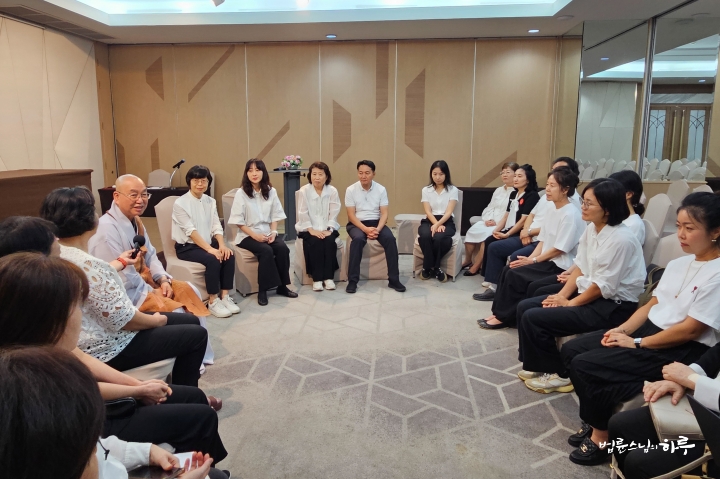
“The most important thing is practice. Only when you practice steadily and first eliminate your own suffering can you do volunteer work and other things. If your own life is difficult, you won’t have the capacity to give to the world. So please practice diligently. Thanks to all your support, I was able to comfortably complete my pilgrimage. I would like to take this opportunity to express my gratitude.”
After exchanging greetings with the volunteers, Sunim departed for Bangkok’s Suvarnabhumi Airport at 10:30 PM. Arriving at the airport at 11:30 PM, Sunim said farewell to the Asia Division members who had come to see him off.
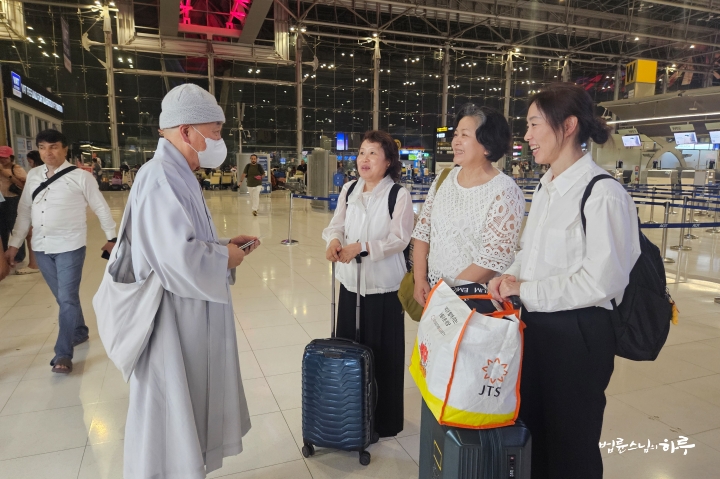
After completing departure procedures, he boarded the flight to Korea. The plane took off from Bangkok Airport at 1:20 AM.
Tomorrow, he will arrive at Incheon Airport at 8:45 AM and immediately head to Dubuk Jungto Retreat Center.





